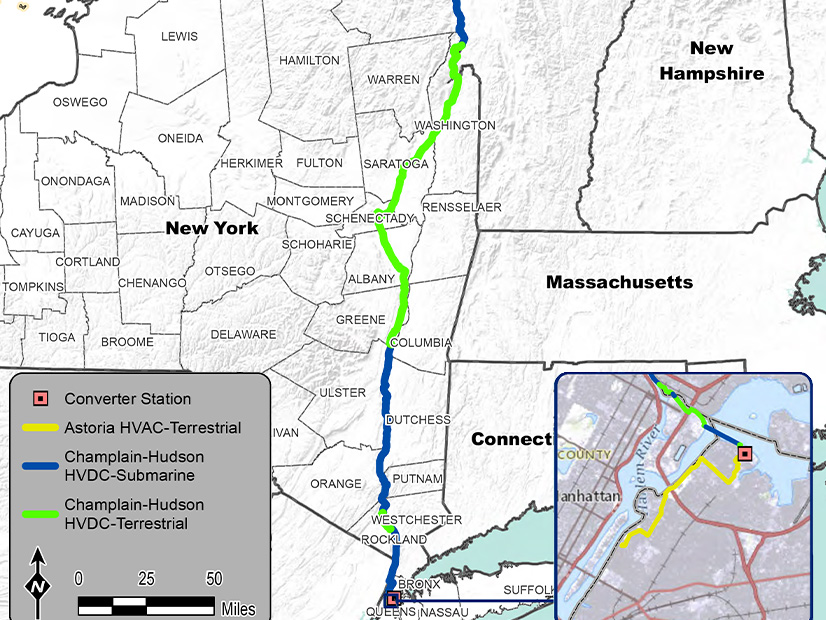
The New York Public Service Commission on Thursday authorized developers of the Champlain Hudson Power Express to take on up to $6 billion in debt to build the transmission line from Quebec to New York City.
The PSC had authorized up to $4.5 billion in debt for the project in February, but the developers asked for an increase just four months later, citing nationwide economic conditions that had changed substantially since they initially submitted their request in November 2020.
The commission also authorized the developers to exercise the rights they have negotiated with the municipalities that the line will cross in the overland portion of its 340-mile route.
CHPE is considered important to New York state’s climate goals, as it will bring as much as 1.25 GW of power generated by zero-emission Canadian hydroelectric plants to New York City, which now relies almost entirely on fossil-generated electricity.
The underground HVDC line was proposed in February 2010 and authorized by the PSC in April 2013.
The company behind the project — a partnership between Hydro-Quebec and Transmission Developers Inc. — says the regulatory review since then has taken longer than it expected. On Aug. 31, it announced it was pushing back the anticipated in-service date from fall 2025 to spring 2026 because of the length of the process, as well as supply-chain constraints for key components.
The developers said Thursday that construction will begin later this year.
The PSC vote was not unanimous. Commissioners Diane Burman and John Howard both voted against the financing petition. Commissioners David Valesky and John Maggiore voted in favor of the measure, but their support was not unqualified.
Burman was concerned about giving the developers the ability to change lenders and modify the amount and terms of the financing without prior approval by the PSC.
Howard said he is opposed not to the project but to the way it is being paid for. “There’s nothing inherently objectionable, and I find many things actually very positive about the concept of … construction of the CHPE line. What I have a problem with, again, consistently, is how we pay for it, making all ratepayers pay, and sort of abandoning the broad and long-held concept of beneficiaries pay.”
Valesky said he shared Burman’s and Howard’s concerns. “However, I did come to a different conclusion,” he said. “I did support that item in February, and I will be supporting this item today.”
Maggiore said his concern that the higher debt limit might impact ratepayers was satisfied and his other concerns with CHPE are ancillary to financing, so it was not appropriate for him to raise them at Thursday’s meeting.
The project has long been contentious. Some opponents worry about the potential for environmental damage caused by construction of the line, 60% of which will run beneath Lake Champlain and the Hudson River.
Others say the net environmental benefit of hydropower is overstated and, in the case of Hydro-Quebec’s vast hydropower infrastructure, harmful to indigenous people.
But project developers have also marshaled support from environmentalists and indigenous communities.
In a news release announcing the PSC’s decision Thursday, Chair Rory Christian said: “In addition to ensuring the safety and reliability of the transmission system, the Champlain Hudson project, and others being developed, will play a key role in our comprehensive plan to modernize our state’s transmission system so that it delivers clean energy to all New Yorkers, while advancing our climate goals and creating clean-energy jobs.”



